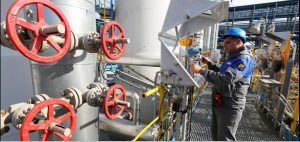Russia has been using gas as a weapon against the EU for several months, artificially restricting gas supplies to the EU. And there is still no clear reaction from the EU, Germany, and the United States, say Maksym Khyłko, Russian and Belarusian Studies Program Director at the Foreign Policy Council “Ukrainian Prism”, emphasizing that this is another proof that no guarantees will stop Russia from using the Nord Stream 2 gas pipeline as a tool of pressure and aggression against Ukraine if this project is launched.
Maksym Khylko, Russian and Belarusian Studies Program Director at the Foreign Policy Council “Ukrainian Prism”, Ph.D., emphasized that the launch of Nord Stream 2 would mean the closing of gas transit through Ukraine under any pretext, as soon as Russia had such an opportunity.
He stressed that the need for transit was an important factor in preventing full-scale Russian aggression against Ukraine. – Moscow will be able to suspend gas transit through Ukraine at any time after the launch of Nord Stream 2, including under the guise of sabotaging the gas pipeline. The political guarantees of the United States and Germany will not work. Russia has been using gas as a weapon against the EU for several months, artificially restricting gas supplies to the EU. And there is still no clear reaction from the EU, Germany, and the United States, he added.
The analyst also noted the recent announcement to deploy S-400 complexes on the Belarusian-Ukrainian border. “The Russian S-400s together with the Su-30SM fighters stationed in Baranavichy will pose a powerful military threat to Ukraine, especially Kiev”, he stressed. He added that Russian planes can reach the Ukrainian capital within 20 minutes.
As he emphasized, also Russia’s announcement that it does not agree to the OSCE mission at border points in Donetsk and Gukovo, shows that Moscow wants to be able to quickly redeploy troops to the occupied areas of Ukraine in the Donbas.
**
PolskieRadio24.pl: A few days ago, Alexander Lukashenka announced that S-400 complexes could be deployed in Belarus. He stressed int that context that Belarus has over 1,000 km of border with Ukraine. How would you comment on that?
Maksym Khylko, Russian and Belarusian Studies Program Director at the Foreign Policy Council “Ukrainian Prism”
When we hear from Lukashenko about the deployment of the S-400 on the border with Ukraine, we must understand that Lukashenko is only voicing Putin’s wishes. Russia has recently set up two de facto military bases in Belarus under the guise of training and combat centers in Grodno and Baranovichi. The first one is close to the strategically important Suwalki Corridor; and from the second one, in Baranovichi, Russian fighters can reach Kyiv in 20 minutes. The Russian S-400 along with the Su-30SM fighters stationed in Baranovichi will pose a powerful military threat to Ukraine, in particular to Kyiv. This will be used by Moscow both for provocations and to increase political pressure on the Ukrainian leadership.
Why the Russian Federation objects to the extension of the mandate of the OSCE Border Observer Mission of the Russian Federation at the checkpoints Gukovo and Donetsk?
Firstly, Russia expands own possibilities for sudden and rapid transfer of troops and weapons to the occupied territories of Donetsk and Luhansk regions of Ukraine. Secondly and more importantly, Moscow demonstrates its willingness to raise the stakes and to escalate, thereby increasing political pressure on Kyiv and its Western partners, demanding concessions from them.
What are the results of Zelensky’s visit to the U.S.? What are the positive or negative aspects?
Given not the best possible time, the complicated situation in the world, in the United States, and in Ukraine, Zelensky’s visit to the United States can be assessed generally positively. The U.S. and Ukraine decided to reinvigorate the Strategic Partnership Commission. The parties signed the Strategic Defense Framework − surely it does not provide Ukraine with the desired Major non-NATO ally status − but still, it creates a good foundation for the enhancement of U.S.-Ukraine strategic defense and security cooperation.
The Joint Statement on the U.S.-Ukraine Strategic Partnership that was signed during the visit lists many promising areas of cooperation, including R&D, cybersecurity, strategic energy and climate dialogue, commercial cooperation etc. Now it all depends on whether all the announced areas of cooperation are effectively implemented through specific cooperation projects, or remain only good intentions on paper.
What do we miss after this meeting? What can we expect as far as NS2 is concerned?
Unfortunately, there are some disappointments for the Ukrainian side, although they were quite predictable. First, it concerns the issue of NATO Membership Action Plan (MAP) and the issue of Nord Stream 2.
There was no statement in Washington in support of providing MAP to Ukraine, but only traditional words of respect to Ukraine’s aspirations to join NATO. The Nord Stream 2 was called a threat to European energy security, but Ukraine has not received any clear guaranties or at least explanation on how the possible Kremlin’s use of energy as a geopolitical weapon would be prevented.
What could be the consequences of the launch of NS2?
The launch of Nord Stream 2 significantly increases Moscow’s ability to put pressure on Kyiv and threaten Ukraine with full-scale war. Previously, the need for gas transit through Ukraine was one of the deterrents for Russia, as a full-scale war would damage the pipeline. Now Moscow may no longer care about this issue. Moscow will be able to stop the transit of gas through Ukraine’s territory at any time after the launch of Nord Stream 2, for example under the guise of some sabotage on the pipeline. The political guarantees of the United States and Germany will not work. Russia has been using gas as a weapon against the EU for several months now, artificially restricting gas supplies to the EU. And there is still no clear reaction from the EU, Germany and the United States.
***
Ed. Agnieszka Marcela Kamińska, PolskieRadio24.pl



